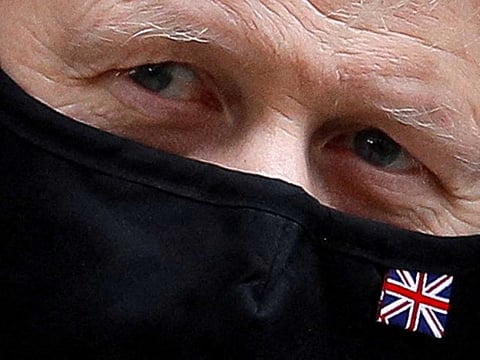UK party politics and Boris Johnson
British Prime Minister needs to focus on key pressing issues facing his nation and world

For months now, the United Kingdom has been politically paralysed by the string of problems that have been associated with Prime Minister Boris Johnson and his administration at 10 Downing Street. The partial publication of a senior civil servant’s report into a series of parties that breached the UK’s coronavirus preventive measures has done little to quell the crisis, and the intervention of Scotland Yard has only served to prolong the sense of crisis at the centre of the British government.
This political crisis continues to dominate the agenda in the UK, partially paralysing the necessary work of government.
Ofgem, Britain’s energy regulator, announced a huge increase in the energy cap paid by some 20 million households, with Chancellor Rishi Sunak also unveiling a series of measures to counter this cost of living crisis. But that news was surpassed by the news of resignations of four senior Downing Street advisers to Johnson.
Over the past two years, the Johnson government has made “levelling up” — rebalancing the amount of investment by government in local communities and cities, where London and the southeast currently get the lion’s share — to assist towns and cities across the rest of England and Wales.
Michael Gove, the minister responsible for levelling up, made a significant announcement, covering more than £8 billion (Dh39.7 billion) in funding for levelling up on Wednesday — but the impact of the scale of investment was lost in criticism that it was an attempt by the Johnson government to shift the attention away from the partygate scandal.
Similarly, Johnson paid a visit to Kyiv and spoke to Russian President Vladimir Putin in an attempt to de-escalate the crisis in Ukraine, but those diplomatic efforts were lost in the furore over who attended what party in Downing Street.
For Conservative MPs, where their inboxes are full of emails from constituents angered by partygate and the cost of living crisis, this is a time of deep reflection and mulling the future of their leader who led them to huge electoral success just two years ago.
For Johnson, this chapter has weakened his authority and it remains to be seen if indeed he can ultimately survive the current storm. But with so many storm clouds gathering over gas and fuel prices, national insurance premiums about to rise come April 1, a Brexit deal that is unravelling in Northern Ireland, and Ukraine on the brink, Johnson needs to put ‘partygate’ behind him once and for all.



